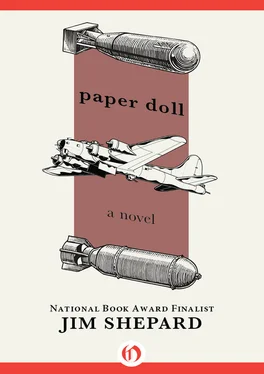Back in the dorsal seat he reconnected his interphone to a flood of voices. Cooper told Lewis to hang on, they’d be home soon.
“I’m fine,” Lewis said. “Just doing my best to bleed to death back here.”
The fighters were back on the return flight, but in diminished numbers and intensity, it seemed to Bryant. Two spiraled through the formation just above him in perfect choreography, flashing their powder blue undersides and black crosses at him before looping out of sight.
What pilots these Germans were! He tracked and fired at them like someone throwing stones at sparrows. Even as he fired he felt reduced by their elusiveness and invulnerability, and found the impersonal nature of their menace unsettling and fascinating. They concentrated on the rear of the flight, and he fired industriously and fruitlessly at a few echelons streaking past until Eddy reported fighter escort coming back to meet them and the last Germans wove away behind them and dipped into clouds and were gone, leaving the horizon beyond their contrails clean, the sky bare.
They began descending over the Channel. Bryant felt exhilarated and lucky and thought briefly about the unknown plane he’d seen falling back. “You’re right, Doctor,” Snowberry said, his interphone making him sound like Walter Winchell. “We never should have called it ‘a silly native superstition.’” The interphone became noisy with comments, everyone asking if anyone had seen what they had seen. When the plane dropped below 12,000 feet they were able to get off the oxygen and felt better and safer breathing freely. Bryant went back to the waist, where Lewis was sitting up, wrapped in blankets. Another blanket was folded behind his head as a pillow. He looked okay, more or less. Snowberry was tucking him in and Ball and Piacenti were working awkwardly around them, stowing the waist guns inside.
Bryant hunched nearer. Lewis shrugged. “No problem,” he said. “You should see my flak vest, though.”
“Are you comfortable?” Bryant asked.
Lewis nodded. “I make a nice living,” he said.
There was a crashing and loud metal sounds and the plane banked violently to the left, tumbling everyone together in a heap, and they scrambled up to Bean’s screams that there were bandits, bandits, and the plane continued such violent evasive action that Bryant pinballed his way back to his station, slamming knees and elbows trying to climb back into his turret, and when he finally pulled himself onto his seat by the gun handles they were rollercoastering low over the treetops, the scattered flight around them at various altitudes also weaving and turning. Behind them a pillar of black smoke grew upward in a staggered column and at nine o’clock someone’s 17 was trailing fire steadily, and they all watched as it sailed into a gently rising hill like a skater gliding into a wall. The concussion gave their plane an extra bit of lift.
Piacenti was cursing in a violent stream, badly frightened, and still trying to unshackle the guns. Bryant spied four black shapes high above them heading back to Germany. “Ju88’s,” he said over the interphone. “Six o’clock high withdrawing.” They were jet black and appeared harmless and unreal, right off the silhouette charts.
Another Fortress came in short of the field. They flew over it and the crew was still piling out, and it looked as if everyone was unhurt. Of the twelve planes that had taken off that morning, nine returned, with Paper Doll one of the last. Gabriel fired flares on his approach to signal wounded aboard, and the meat wagon trundled out to their nose before they’d come to a full stop, but Lewis climbed out of the waist himself, showing off the hole punched in his flak vest and the spent 20mm incendiary shell that had done it. Everyone wanted to see, and his luck was at once considered to be potentially legendary. Beneath his vest the meat of his pectorals had been sheared up a bit, he reported, but it was pretty shallow, and he chose not to ride in the meat wagon. He walked along with them holding the incendiary in his fist happier than Bryant had ever seen him. “Imagine this scar with the girls,” he said. Even more cheering, they all understood, was the seemingly incontrovertible evidence this represented that he led a charmed life, and they flew with him.
Paper Doll ’s engines went on ticking and hissing and pinging as they cooled, smelling strongly of diesel. The knees were torn on Snowberry’s flight suit, sheepskin gaping out. “You look like you were hit, too, Sergeant,” Cooper said.
Snowberry shrugged. “Yes, sir. No room. The bolt mechanisms in the guns tear my knees. This is the third pair. The requisition people hate me.”
Their elation for Lewis wore off, and they all suddenly felt exhausted. They stood around empty and silent as if at a horrible party. Trucks carried them to debriefing rooms. They each were allowed a shot of whiskey from the bar and then they argued with each other over what they had seen and what they had done, still awkward in their flying gear, everyone angry and relieved and not giving ground on their version, while the intelligence officers looked and listened and tried to piece together one plausible narrative from all the information.
Part Two. The Glass Mountain
After they’d been able to eat Bryant found himself back at the plane, restless despite his exhaustion, and he watched Lewis and Gabriel carry out a holes count, clambering over the plane’s upper surfaces and calling out the jagged machine-gun and cannon-fire holes. Tuliese stood below them, his arms crossed.
Lewis stood erect on the stabilizer and counted with his fingers. “We could drain noodles through our tail, Lieutenant,” he said.
Tuliese found a few more holes forward near Snowberry’s turret. “Lieutenant, what the hell you been doin’ to my ship?” he complained.
“You got off easy, Sergeant,” Gabriel said. “I heard Archangel may be Category E, from the Ju88’s.” Category E meant wrecked beyond repair, unsalvageable.
“I heard the pilot of Archangel was so mad about being jumped that he wouldn’t get out of his plane after he brought it in, sir,” Lewis said. “That true?”
Gabriel said it was. “Gus Truncone. He says cannon shells caved in the whole right side of his cockpit. Looks like a single-seater now.”
Lewis climbed down from the tail. “Is the co-pilot hurt?”
“No,” Gabriel said. “He’s dead.”
They were silent, watching Gabriel make his own check.
“And his best buddy was on Home for Dinner , listed as missing.”
“Missing,” Bryant said, angry with the vagueness. They turned to look at him. “Like he took a wrong turn at the mess after breakfast.”
Gabriel nodded. “That’s about it,” he said. “Isn’t it?”
Later the crew gathered around Paper Doll for another photo, crowding around Lewis, who held his battered flak jacket aloft with one hand and the remains of the incendiary shell in the other like a small prize fish. They were all there, uneasy and apprehensive, to celebrate Lewis’s good fortune, all but Cooper, who it was reported had gotten the shakes soon after debriefing, and Piacenti, who had wandered away from the plane before the photo session had been organized, and sat up across the way on the hardstand, watching them.
After chow they walked to The Hoops, the village pub. It rose two stories with a quaint lean and Bean was forever getting over the fact that it had a thatched roof.
Hirsch had not been invited, and Bryant was starting to get used to the idea. Snowberry returned to their table with a large red tray full of the oversized English pints. “The way they water them down, it’s a normal beer, all told,” Piacenti said.
Читать дальше












